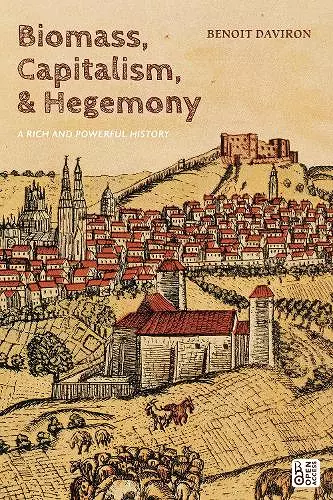Biomass, Capitalism, and Hegemony
A Rich and Powerful History
Format:Hardback
Publisher:Bloomsbury Publishing PLC
Published:23rd Jan '25
£70.00
Supplier delay - available to order, but may take longer than usual.

An authoritative, groundbreaking account of the biological underpinnings of Western capitalist hegemony by a field-leading scholar of critical development studies
How did Europeans achieve global dominance and continue to satisfy their ever-growing needs? How do we explain the effects this has on the rest of the world?
In his magnum opus, published here in English for the first time as an open access book, world-renowned critical development scholar Benoit Daviron blends Braudelian history and a food systems approach to show how biomass--as the metabolism of societies and as a source of matter and energy--explains key historical phases of Western capitalist hegemony and the transitions between them. By examining various uses of biomass, technical production and extraction methods, forms of labour mobilization, and exchange systems, Daviron provides startling new insights into capitalist development from the 16th century to the present.
This book is essential reading for students and scholars of critical approaches to global development, and for anyone interested in how capitalist domination came to be and how the bio-meatabolic imbalances it created might be redressed.
The ebook editions of this book are available open access under a CC BY-NC-ND 4.0 licence on bloomsburycollections.com.
Biomass, Capitalism, and Hegemony brings political economy down to earth. Daviron penetrates the glittering surface of money to reveal a long history of successive ruptures in social metabolism, in which societies like living organisms, consume resources and produce waste. For millennia, biomass from plants supplied all human needs. Empires 500 years ago began to stretch solar metabolisms in space by reaching into distant landscapes to extract biomass, using enslaved labour, but still relying on energy from sun, wind, and water. Centuries later metabolism stretched in time by reaching deep into the earth for stored fossil energy and minerals. The “industrial revolution” not only separated labour from land, but also shifted the metabolic regime to mining. Viewed as metabolic regimes, wars are not only about hegemonic transitions from losers to victors. They create successive separations of “industry” from “agriculture,” and finally the rise of chemical industries that dominate agriculture and food along with everything else. More than cyclical transfers of wealth and power, extraction of biomass and energy have cumulatively led humans to a precipice, in which small course reversals face towering power and wealth locked into a disastrous trajectory of extraction and war. * Harriet Friedmann, Professor Emeritus of Sociology, University of Toronto *
ISBN: 9781350443242
Dimensions: unknown
Weight: unknown
424 pages